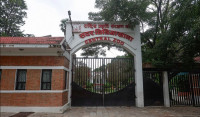Valley
Juju Dhau makers struggle to stay in business
Juju Dhau, “the king curd” which has become an integral part of Bhaktapur’s identity, is now in trouble due to shortage of milk, increasing number of local dairies
Anup Ojha
The traditional Juju Dhau—a thick, creamy and sweetened custard-like yogurt which is an essential dish for all feasts and celebrations in the Valley—will no longer be available if the current trend continues people who are involved in its business say.
“We are going through a hard time sustaining this profession. Our milk suppliers have decreased as they have started leaving the country for better pastures overseas. If this trend continues, I have to look for another alternative,” said Bishnu Bhakta Sintakala, vice-chairperson of Bhaktapur Juju Dhau Sangh (BJS). Sintakala himself is a third generation Juju Dhau maker. The city receives milk from surrounding villages like Tathali, Sudal, Duwakot, Kharpati and Nagarkot.
Another problem facing the traditional Juju Dhau suppliers is the shortage of kataaro. “These days, local potters are reluctant to make kataaro due to the shortage of clay, and consequently it has become expensive,” Sintakala said. A kataaro that holds one litre yogurt costs Rs 15 and the larger ones cost higher. “This is what makes the Juju Dhau expensive,” said Punam Shakya, a yogurt maker at Sukuldhoka, an area which boasts seven traditional Juju Dhau shops. Shakya said they need three liters of milk to make one liter of curd. “We have to boil and sweeten the milk to make the curd. If the milk curdles that goes to the waste,” she said.
In the local market one liter of Juju Dhau costs Rs 150 while the normal yogurt at local dairies can be available for Rs 100. “Obviously Juju Dhau has better taste and better quality. However, people look for minimum cost when they have to buy,” Shakya said. Bhaktapur now has seven large dairies, and Juju Dhau makers claims a large quantity of milk is being consumed by such dairies.
According to BJS Chairman Krishna Gopal Saiju, the district boasts more than 55 Juju Dhau shops, which need more than 9,000 liters of milk. He says Bhaktapur now produces 8,400 liters of Juju Dhau. Of the total production, around 30 percent is consumed locally while the remaining is supplied to other cities in the Valley as well as places like Pokhara, Dharan and Chitwan.
Because of the huge investment in the sector, some Juju Dahu sellers are involved in supplying adulterated curd in the name of Juju Dhau, tarnishing the real value of this traditional yoghurt.




 27.68°C Kathmandu
27.68°C Kathmandu.jpg)











